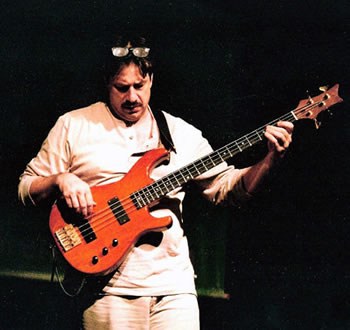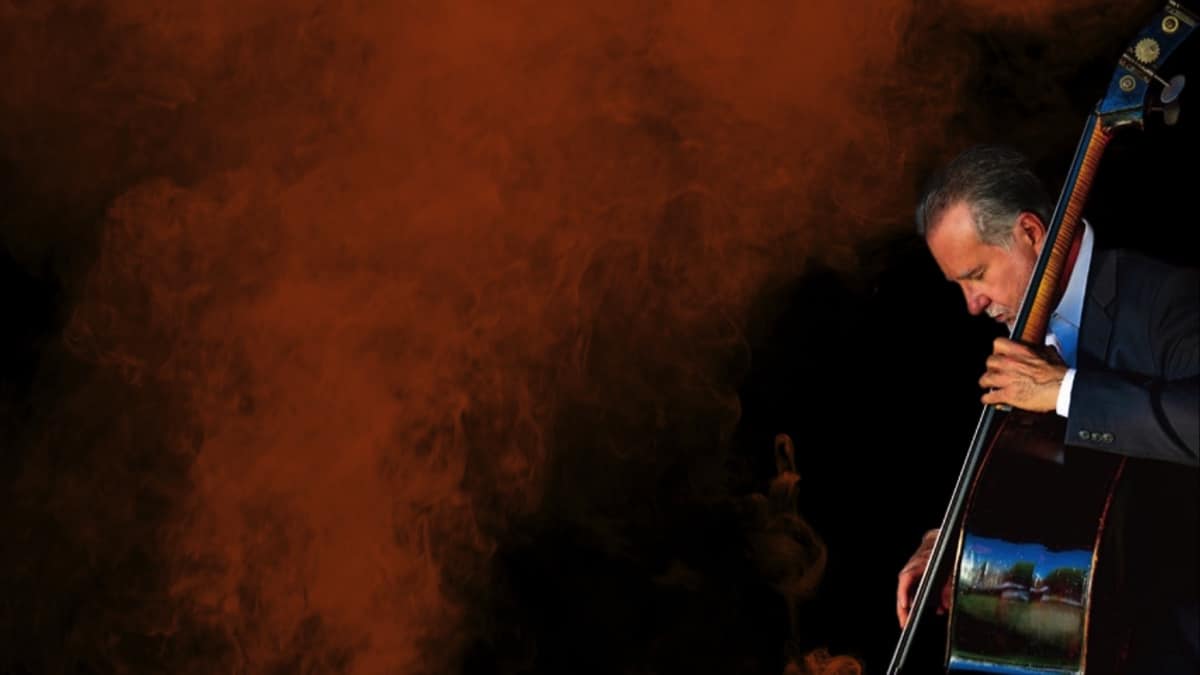Cover
Bass Musician Magazine: Jun/Jul 2009 Issue Featuring Jeff Berlin

Jake: In my interview with Mike Pope, he talked about the great classical pianists. His father was a classical pianist, and he spent a great deal of time listening to that genre. One of the statements that he made was after considering the virtuosity and the innovation that these great classical pianists had accomplished, that as far as our instrument (electric bass) was concerned, he felt we basically have just begun to scratch the surface of its possibilities compared to what those virtuosos had achieved on their instruments.
Jeff: You can always do something on an instrument that hasn’t been done. There’s absolutely no way that anybody has ended the development of an instrument. The one problem with most musicians is that their own improvement relies upon what they’ve heard from other musicians, said another way, the invitation of a bass player listening to another bass player. That’s why I don’t play a fretless bass–that’s why I don’t play harmonics–that’s why I don’t play that staccatoish type of thing. Jaco Pastorius’ contribution was so strong, that a whole generation of bass players simply just sounded like him. Every bass player that was a little bit into fusion imitated him. People argue the point, and I don’t mind, it makes for good debate, why deny yourself the tools that are available to use and play. The only answer that I can respond with, because I’ve had this question presented to me before, was that if you take away from a bass player a fretless bass, and gave him a fretted bass, you’d have it, because no one had “defined” the sound of the fretted bass. The fretless bass was purely an innovation of Jacos. Who defined the piano, or defined the drums, or defined the trumpet? You can’t say. But anybody who is historically savvy would know that Jaco defined fretless bass. Think of it this way… an old Precision four string going through a B15 and a player—do you follow what I’m saying—nothing more basic than that….a man or a woman, their amp, and their bass. “That” is the source of creativity. That simplicity has all the potential to lead someone to becoming the most creative musician that ever lived. But to achieve that, you’ve got to deny yourself the easy path, which has always been imitating someone that’s done the hard work for you.
Jake: Wouldn’t we want to take look at in this scenario, the process of emulation, which I think is quite simply part of the learning process. We can capture things, and learn things, which I don’t feel is a negative. I’m certainly guilty of that myself. But I do understand and agree with your point about the need to get beyond that, which many of us do not.
Jeff: Well, I appreciate your honesty. There are players that are still copying the style of the past greats, and have built entire careers around that. How many players are out there building a career on the shoulders of Jacos original work and musical contributions? What you said earlier, and you’re right about this, is that emulation is essential. I’m still emulating Keith Jarrett for cryin-out loud. We do emulate—we do seek out sources in our early formative years, and many times that’s the first source of inspiration. I wanted to be Jack Bruce… I wanted to be Stanley Clarke. When a musician makes a statement and a musician says that this is me, that is the point that separates one from the developmental period to the artistically formed period of a musician’s life. If you hear a musician and hear very powerfully the source of their “formative” musicality, then I submit that these players have a lot more work to do, and potentially a lot of denying. If you see yourself in a void, or a vacuum, you need to fill it with something. My suggestion is to fill it with music. And beyond that, if you’re going to emulate people, emulate people that play another instrument so that nobody will say, man, and you sound just like—fill in the blank. I repeat, emulation is essential—it’s part of the formative process. I imitated Jaco in the early days too—don’t you doubt it. Then I said, oh-oh, too many guys are going to do this, so I turned at that point. Those ten years studying violin in the conservatory gave me enough musical maturity to understand that you don’t make a career imitating another player that closely. And there are several players today, known bass players, that continue to do it. I don’t need to name names, and I don’t want to be rude. I just want to be clear. And the clarity I’m referring to is that it’s a disservice to make a career on someone else’s work. But what I find interesting is that a lot of younger players, listeners, don’t seem to mind. I was just one of the few guys that did. So that seems to be the unique area I embrace. Beyond that, I’m always trying to raise the bar, and my pursuit of that draws me to the conclusion that you get better when you “look” to get better, and really dedicate yourself to improving, and look to do things that other people don’t do. And one way to do that is denying what other people have done. It’s a philosophy. By denying yourself what others have done, you’ve “got” to come up with something. And low and behold, if you dedicate yourself in that manner you will develop a style of bass playing that will be so unique that people might actually start imitating you.
Bass Videos
Brian Bromberg, Paying Tribute to Scott LaFaro – April 2024

Brian Bromberg, Paying Tribute to Scott LaFaro, April 2024…

Brian Bromberg is one heavy-hitting bass player and I am in awe of his talent as one of the few individuals who is equally proficient on electric and upright bass.
You might remember our conversation back in 2018 when he released his powerhouse Funk album. Brian’s “A Little Driving Music” album is a staple on all our road trips and his Jaco and Jimi Hendrix tribute albums are mind-blowing… and I could go on and on.
Now, Brian has taken on the arduous task of producing an album paying tribute to the late, great, Scott LaFaro. He teamed up with pianist Tom Zink and drummer Charles Ruggiero and Brian delivers a commanding performance on upright. The entire album is a masterpiece and a real treat to listen to track after track.
Join us as Brian shares the details behind this project and more.
Photo, Michel Bocandé
Featured Videos
Visit Online
brianbromberg.net
FB @BrianBrombergBassist
YouTube
Cover
Leland Sklar, Over Half a Century of Bass, March 2024

We all have enjoyed Leland Sklar’s Bass lines for over half a century.

You might remember that we had him on our cover back in 2017 and did an update when he launched his book “Everybody Loves Me” in 2020. It was exciting to hear that The Immediate Family had got back together in the studio to work on their own music in 2019 and are now up to two albums.
Just last December, Magnolia Pictures released a documentary titled “Immediate Family” where we got a behind-the-scenes look at the massive contributions Danny Kortchmar, Waddy Wachtel, Ross Kunckle, Leland Sklar and Steve Postell have made in countless songs that are the very essence of our daily personal musical soundtracks. Seeing the astronomical roster of performers they have supported over many years is very eye-opening. It is a must-see for any music lover!
Now, I am thrilled to bring you a special chat with Leland Sklar where we go more in-depth into the bass side of his musical journey.
Photos: Header, Rob Shanahan – Cover Photo, Jay Gilbert/Chris Schmitt
Featured Videos:
Skin In the Game – https://www.youtube.com/watch?v=QhbnzIrdjJ8
from new album Skin In The Game
The Toughest Girl In Town – https://www.youtube.com/watch?v=UVQLZIRfLjU
from new album Skin In The Game
Fair Warning – https://www.youtube.com/watch?v=1DN18DYwLsU –
from the self-titled album The Immediate Family
Visit Online
www.immediatefamilyband.com/
www.facebook.com/TheImmedFamily
www.instagram.com/theimmedfamily/
Bass Videos
Ricky Phillips, STYX Bass And More – February 2024

Ricky Phillips, STYX Bass And More…

I have always been a huge Styx fan. Their music kept me awake during countless nights studying and gave my imagination a place to escape when I had a moment to take a break.
I had the immense opportunity to chat with STYX bassist Ricky Phillips for our August Cover in 2017 and follow his projects as time passed. Now, I am thrilled to have the opportunity to catch up with Ricky as he has been super-busy over the past six years.
Join me as we take a deep dive into the band’s most recent album “Crash the Crown” and EP “The Same Stardust”. Ricky shares some insights into the herculean team effort behind the scenes and the musical process that keeps them ever so busy and how he has updated his sound.
Without further ado… Here is Ricky Phillips!
Photo: Jason Powell
Featured Videos:
“Crash of the Crown” lyric video
“Reveries” lyric video
“Save Us From Ourselves” lyric video
“Sound the Alarm” lyric video
“Too Much Time On My Hands” Zoom video 2020
Visit online:
www.Styxworld.com
FB & IG @styxtheband
Bass Videos
Jeff Pilson, Foreigner Low End – January 2024

Jeff Pilson, Foreigner Low End – January 2024…

Those of us who were around back in the 70’s remember how certain songs on the radio resonated with us. It turns out that many of these iconic melodies came from Foreigner and they were part of our personal soundtracks!
After all these years, the band is going as strong as ever with Jeff Pilson firing away on bass midstream into a 2-year farewell tour.
I am excited to be able to bring you all the details about Jeff’s musical Journey, the farewell tour in progress, how he gets his sound and his plans for the future.
Cover Photo: Krishta Abruzziini / Video Photos: Krishta Abruzzini, Karsten Staiger, Gina Hyams
Featured Videos
For more news on FOREIGNER and upcoming Farewell Tour dates, fans can visit:
foreigneronline.com
facebook.com/Foreigner
twitter.com/ForeignerMusic
instagram.com/foreignerlive
youtube.com/user/FWebTeam
Also on FB @officialjeffpilson
Bass Videos
Rodney O’Quinn, Rockin’ Hard Through the Years – December 2023

Interview With Foghat Bassist Rodney O’Quinn…

Many rock fans have enjoyed music by Foghat, who originally formed in London back in 1971.
Over the many decades of playing, the band members have changed, leaving behind only Roger Earl as the only original member. Bassist Rodney O’Quinn left the Pat Travers Band and joined the group in 2015 and has been laying down the low end for this iconic quartet keeping the Foghat legacy alive. With a new album titled “Sonic Mojo” which dropped on November 10th, the band is as busy as ever and there is lots of very tasty music to come.
Join me as we learn of Rodney O’Quinn’s musical journey, how he gets his sound, and his plans for the future.
Photos:
Cover, Jake Coughlin
Video Thumbnail, Tom Apathy
Photos used in the video: Kerry Quinn, Chuck Lanza, Kim Granger, Kenneth Strohm, Jake Coughlin, Jay Jylika
Featured Videos:
1st Single from Sonic Mojo – Official “Drivin’ On”
2nd Single from Sonic Mojo – “She’s a Little Bit of Everything Official Video
“Road Fever”- California Mid State Fair – Paso Robles, CA – 7-27-22
“Stone Blue” – Rodney O’Quinn Bass/Lead Vocals – Don Odell’s Legends – Woonsocket, R.I – 10/15/22 – The Stadium Theater
The Earl’s Court – Season 2, Episode 7: Funny Guys
“I Just Want to Make Love to You” – CasinoRama – 6-9-23
FOGHAT “Somebody’s Been Sleepin’ in My Bed” – Mohegan Sun, Uncasville, CT – 1/28/22
“I Just Want to Make Love to You” – California Mid State Fair – Paso Robles, CA – 7-27-22
Visit Online:
www.foghat.com
www.facebook.com/Foghat
www.twitter.com/FOGHAT
www.instagram.com/foghat_official
www.youtube.com/user/FOGHATMUSIC


















